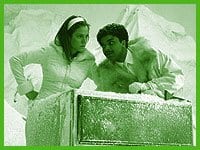One of the founding principles of the United States is freedom of speech. Yet it’s a country where rightwing lobbyists recently compelled a TV network not to air a drama minutely critical of former president Ronald Reagan and where the current president, George W Bush, can ban TV coverage of dead US soldiers being returned from Iraq.
Luckily, American censors totally missed a stunning piece of subversion that aired in the US last month (beginning the same night the Reagan biopic was supposed to air on CBS) and which airs in Canada this week, Tony Kushner’s Pulitzer and Tony Award-winning play Angels In America, a powerful drama that lays bare the huge disconnect between the myths and realities of the good ol’ US of A.
While the subtitle A Gay Fantasia On National Themes has been dropped from the HBO production, the passion, majesty and gay abandon of the original play survive and thrive in this six-hourTV movie adapted with minimal script changes by Kushner and directed by Mike Nichols.
If you’re not already familiar with the story, here’s a recap. It’s New York City in 1986. A gay couple comes unglued when one of the pair, Prior Walter, discovers he has AIDS; his partner Louis cannot cope and abandons Prior. Louis finds solace with a closety Mormon lawyer, Joe, who cannot leave his pill-popping wife, Harper, who takes “trips” to exotic locales without leaving their apartment.
The lawyer falls into the orbit of Republican powerbroker Roy Cohn, “the distillation of American evil,” a closeted homosexual with AIDS and former assistant to the infamous red- and homo-baiting senator Joseph McCarthy. Into the mix are thrown Prior’s best friend Belize, who’s a nurse on the AIDS ward where Prior and Cohn end up, Joe’s mother and a whole host of spectral beings: ghosts of Prior’s ancestors and executed spy Ethel Rosenberg, Harper’s imaginary travel agent friend and a horny, hermaphroditic angel with eight vaginas.
It’s a roiling cauldron of guilt, desire, faith and troubled relationships set against the backdrop of a new plague and Reaganomics.
Angels In America is a sprawling, messy epic with incredible ambition, moving poetry and great characters.
Despite its political and intellectual ambitions, at its heart, Angels is about people: the shadow puppet play of lovers in failing relationships, the straightjacket of tradition passed from one generation to the next, the unique passions of friendship.
There’s brilliance in the cast. Al Pacino, in his first-ever TV performance, electrifies in the show-stopping role of Cohn, a seductive monster who obviously fascinates Kushner. When Pacino in his first scene, hand over phone, stage whispers to Joe, “La Cage – it’s fabulous. Best thing on Broadway,” you know he’s nailed it.
Maintaining some of the play’s theatricality, the movie lets actors double and triple up on roles. So we get to see Meryl Streep do three spellbinding turns: as a cynical old rabbi, a naïve Mormon mom and a vengeful Ethel Rosenberg.
Jeffrey Wright, who won a Tony for his 1993 performance in the first combined New York production of both parts of the play (separately known as Millennium Approaches and Perestroika), returns as the African American Belize, a real-life angel from whose mouth originates the harshest criticisms of the American dream. This time out, Wright rightfully tones down the character’s flamboyance for the small screen.
The rest of the cast are good: Newcomer Justin Kirk plays Prior, Patrick Wilson plays Louis and Mary-Louise Parker plays Harper. But I found myself missing Broadway’s Stephen Spinella (as Prior) and especially Marcia Gay Harden (as Harper). Parker’s performance lacks sufficient depth, contributing to the second three hours dragging a little.
Though the acting and direction falters occasionally, Kushner’s glorious script continues to shine.
Like the character Prior, Kushner wrestles some powerful angels to the ground, making vivid the connections between the personal and the political.
At a personal level, Kushner seems to demand freedom of movement, of desire, suggesting that certain characters need to move on despite the consequences. Yet he illustrates that freedom is a myth, that an egomaniac like Cohn can only operate by pretending he is free from all constraints. Love demands responsibility, not freedom. Kushner provides no easy answers on how to find the middle path between selfishness and self-preservation.
On a political level, Angels can be seen as an indictment of an America free from constraints and contemptuous of international opinion and responsibility.
Most surprising is how little Angels has dated, if at all, how relevant, even prescient, are its attacks on neo-con thinking and maneuvering. Attitudes towards homos may have changed in many quarters, but America still demands demons, still prefers pompous rhetoric to compassionate practicalities and still sees itself as God’s chosen instrument in a world abandoned by God.
Heady stuff? Angels In America inspires brainy thoughts, yet manages to be wildly entertaining and moving, too.
* Beginning this week, Angels In America airs on TMN in different configurations. Two three-hour segments are broadcast at 8pm on Sun, Jan 11 and 18; six one-hour episodes air Monday to Wednesday at 8pm beginning Mon, Jan 12. Check Tmn.ca for a complete schedule.


 Why you can trust Xtra
Why you can trust Xtra


